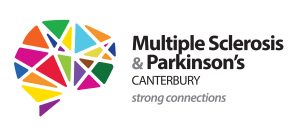MS Support Organisations
Who can help me?
There are many supports available to help you manage your diagnosis:
- MS and Parkinson's Canterbury
- General Practitioner
- MS Nurse
- Neurologists
- Community Occupational Therapist
- Community Driving Assessor
- Community Physiotherapist
- Needs Assessment
- Rehabilitation
- Neuro-physiotherapists
- WEKA
- Health Passport
MS and Parkinson's Canterbury
We have been supporting people with MS or Parkinson's for almost 60 years. We have skilled and experienced professionals providing one-on-one support and information to people living with MS.
General Practitioner
Your general practitioner (GP) is your main health care provider, so do your best to locate a GP with an interest in MS. It’s important to communicate your worries and symptoms as clearly as possible so you can get appropriate assistance. Your GP will be able to refer you to a neurologist or other specialist (e.g. physiotherapist) if there are questions and concerns.
Consult your GP if you are worried about any aspect of your health at any time. You may find that she/he cannot answer some of the questions you may have about your future. MS is a highly unpredictable condition and no two are the same. There will be times when the only honest answer your doctor can give you is “I don’t know”.
MS Nurse
MS nurses are qualified nurses with specialist training to provide clinical advice and support to people with multiple sclerosis. MS Nurses are employed by regional DHBs. Not all DHBs have a specialist MS Nurse but will likely have a key contact for questions regarding your treatment.
Neurologists
Most people will see a neurologist, either hospital-based or in private practice, to confirm their diagnosis. Normally, they would order an MRI scan (magnetic resonance imaging) to confirm their diagnosis. An appointment can be made through your general practitioner (GP).
If you’ve only seen one doctor, it’s certainly reasonable to get a second opinion if you’re not happy about the diagnosis. Your original doctor should not be insulted or hurt because you want to confirm your diagnosis.
Other sources of support:
The following information and referrals are available from your local GP. These are invaluable sources of help, supplies, and governmental funding should you require their services. Not only are they very important; they’re usually completely free.
Health Passport
It is common for people, with or without MS, to forget about symptoms when visiting your health professional. The Health Passport is a booklet that you take with you when attending appointments or when out and about. The booklet tells people how they can support you and how best to communicate with you. It also provides space for you to note any symptoms or relapses to advise your health professional at your next visits
For more information about Health Passports visit the Health and Disability Commissioner website
Download and print your own Health Passport here
Order your hard copy Health Passport here
MS Diagnosis Cards
You may find yourself in situations where you need assistance, access to toilets or just a helping hand. MSNZ has developed a Diagnosis Card which you can keep with you at all times to show people that you have a diagnosis and require support. Ask us for your free Diagnosis Card and write on the back any contacts in case of emergency.
Community Occupational Therapist
A Community OT knows how to minimise the difficulties a person with MS may encounter, and how to access funding from regional agencies for aids such as handrails or tools for ease of living and safety around the home. They are able to submit applications to do with mobility and make referrals for vehicle modifications and to Disability Support Link (DSL) peoplewho assess and fund personal care and housekeeping hours.
Community Driving Assessor
This person will discuss and approve vehicle adaptations should you require any. If necessary they can arrange for trials of different hand or foot controls and can assist in overcoming a host of vehicle-related difficulties. Should your condition reach a stage where driving is no longer considered safe for yourself or other road users a Community Driving Assessor will be referred to make this decision.
Community Physiotherapist
Available to provide home visits to help with issues relating to changes in the body. They can advise on exercises and ways of reducing the strain on weakening muscles. Referrals to Speech Therapists, Urology Clinics and any other support services can also be accessed through your GP.
Needs Assessment
A needs assessor is the person to see if you have complex physical needs and require personal care of home help. Needs assessors can be contacted through a health professional, your Regional MS Community Support Staff or by self-referral. The MS Society, however, recommends you contact your Regional Community Support Staff first, who will be able to provide support when meeting with a Needs Assessor to ensure you receive the best support and service.
Rehabilitation
We can refer you to a local rehabilitation centre. Contact us on (03) 366 2857.
Exercise Physiologist
Our exercise physiologist can help you with mobility, balance and movement problems by working with you to attain your maximum physical capabilities. Contact our office on (03) 366 2857 to make an appointment.
WEKA
What Everybody Keeps Asking about disability information is a New Zealand website and multimedia resource centre where people can access information for those with disabilities, their families, whānau and caregivers, health professionals and disability information providers. They cover everything from support services to equipment hire and can also be contacted via email at: weka@enable.co.nz or phone 0800 17 1981.
